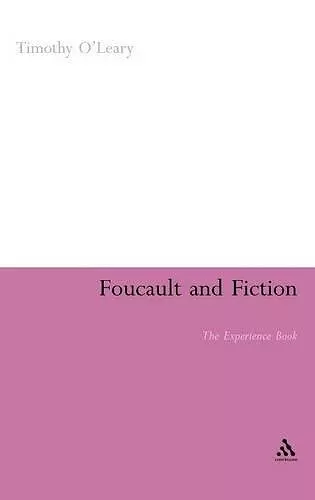Foucault and Fiction
The Experience Book
Format:Hardback
Publisher:Bloomsbury Publishing PLC
Published:27th Aug '09
Currently unavailable, and unfortunately no date known when it will be back

This monograph develops a unique approach to thinking about the transformative power of literature by drawing upon the much-neglected concept of experience in Foucault's work.
Develops an approach to thinking about the transformative power of literature by drawing upon the much-neglected concept of experience in Foucault's work. Starting from the premise that works of literature are capable of having a profound effect on their audiences, this book suggests a way of understanding how these effects are produced.This monograph offers a new interpretation of Melville's work (focusing on "Moby-Dick", "Pierre" and "Benito Cereno") in the light of scholarship on globalization from critics in 'new' American studies. In "Melville, Mapping and Globalization", Robert Tally argues that Melville does not belong in the tradition of the American Renaissance, but rather creates a baroque literary cartography, artistically engaging with spaces beyond the national model. At a time of intense national consolidation and cultural centralization, Melville discovered the postnational forces of an emerging world system, a system that has become our own in the era of globalization. Drawing on the work of a range of literary and social critics (including Deleuze, Foucault, Jameson, and Moretti), Tally argues that Melville's distinct literary form enabled his critique of the dominant national narrative of his own time and proleptically undermined the national literary tradition of American Studies a century later. Melville's hypercanonical status in the United States makes his work all the more crucial for understanding the role of literature in a post-American epoch. Offering bold new interpretations and theoretical juxtapositions, Tally presents a postnational Melville, well suited to establishing new approaches to American and world literature in the twenty-first century.
"An insightful exegesis of an ethics of fiction, an art that transforms readers' experience of the world by daring them to think differently... Foucault and Fiction demonstrates from the outset that O'Leary is deeply familiar with Foucault's work on literature, experience and ethics, and perceptively links the transformative effects of literature with ethical practices of the self... I highly recommend this book for readers interested in the work of Michel Foucault, literature theory and/or Irish literature. But I also endorse this book for those fascinated with how reading catalyses a ?transformative? experience, an experience that can change your world in one ‚shocking or arresting? moment or gradually, through the passing of time. Foucault and Fiction is pleasurable to read and astute in its use of philosophy, literature theory and reception studies. It is an integral text for anyone struggling to reconcile how art, ethics and politics merge in the transformative potential of literature" -- Foucault Studies, February 2010
"Looking at literature in relation to experience and ethics, O'Leary ponders whether a novel, a poem, or a play can really make someone think differently about things, and if so, how it does. He takes a model of ethics from French philosopher Michel Foucault (1926-84). Among his topics are literature, experience, and ethics; the ungoverned tongue in Seamus Heaney; Foucault's turn from literature; language, culture, and confusion in Brian Friel; Foucault's concept of experience; James Joyce remaking experience; the experimental subjects of Swift and Beckett; and ethics and fiction." -Eithne O'Leyne, BOOK NEWS, Inc.
ISBN: 9780826495952
Dimensions: unknown
Weight: unknown
192 pages